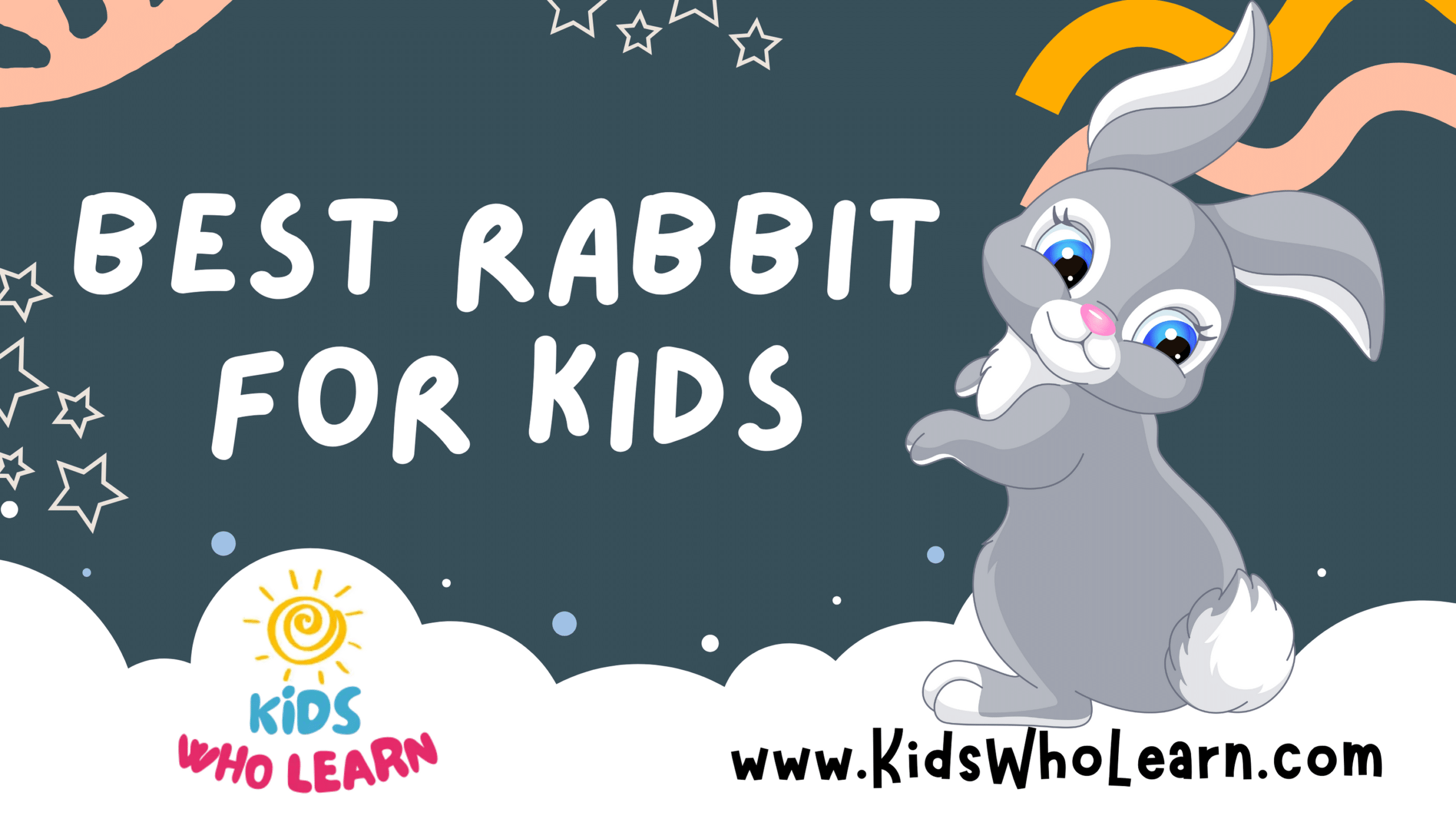Choosing the right pet for your family involves considering the needs and characteristics of the animal, as well as the lifestyle and age of the children it will be interacting with. Rabbits are a popular choice for a family pet due to their gentle nature and the moderate level of care they require. However, not all rabbit breeds are ideal for children; some may be more suitable than others based on their temperament, size, and care needs.
We know that children benefit from interactions with pets, learning valuable life skills such as responsibility, compassion, and empathy. Rabbits can offer these learning experiences without the high maintenance that other pets may demand. To ensure a positive experience, it’s essential to select a rabbit breed that is known for being friendly and calm with kids. Additionally, teaching children how to properly care for their new pet rabbit will foster a relationship built on mutual trust and understanding.
Key Takeaways
- Certain rabbit breeds are particularly well-suited for families with children.
- A child’s ability to care for a rabbit can teach important life skills.
- Educating children about proper rabbit care is crucial for a harmonious pet-child relationship.
Understanding Rabbits as Pets
Bunnies make wonderful companions, but it’s important for us to understand their needs and behaviors to ensure a successful integration into the family. Let’s explore what makes rabbits suitable pets for children and what should be considered prior to making the commitment.
Rabbit Basics
Rabbits are social, playful creatures with some unique requirements. They are prey animals by nature, meaning they may need specific environments to feel safe and secure in our homes. Biologically, these animals have a delicate digestive system, so diet and nutrition are vital to their health; a mix of high-fiber hay, fresh vegetables, and a small number of pellets is their ideal diet.
Lifespan: Typically, a rabbit can live around 8 to 12 years with proper care; hence, the decision to bring one into our home is a long-term commitment.
Housing: Indoor housing with room for exercise is essential. We should provide a spacious cage or pen and an opportunity for the rabbit to explore a rabbit-proofed area under supervision.
Benefits of Rabbits for Children
Rabbits can enrich a child’s life with their affectionate and gentle nature. They offer companionship, which, in turn, can nurture a child’s sense of responsibility and empathy.
Child-Friendly Breeds:
- The Mini Lop is known for its friendly disposition.
- Dutch Rabbits are generally social and easy-going.
- Rex Rabbits have a calm temperament, suited for patient children.
Introducing a rabbit to a child provides an opportunity for learning about care and the responsibilities that come with looking after another living being.
Considerations Before Choosing a Rabbit
There are several factors we need to consider before committing to a rabbit as a pet:
- Time and Engagement: Rabbits require daily interaction and attention. They are not ‘starter pets’ and need an adult to supervise their care.
- Veterinary Care: Access to veterinary care specializing in small pets is crucial because rabbits require regular check-ups and can be prone to specific ailments.
- Expense: The cost goes beyond the initial adoption fee and includes habitat, food, healthcare, and grooming supplies.
Involvement from the whole family is necessary, as caring for a rabbit is a team effort that helps distribute the load and enriches the experience for everyone.
Selecting the Right Rabbit Breed
When we consider introducing a pet rabbit to a home with children, we look for breeds that are known for their gentle temperaments and appropriate size. These factors are crucial in ensuring a good match for family environments.
Size and Space Requirements
We recommend assessing the space available in your home before choosing a rabbit breed. Small to medium-sized breeds like the Mini Lop or Holland Lop are ideal for indoor living due to their compact size. These rabbits typically weigh between 3 to 6 pounds, requiring less space than larger breeds. Ensure that you have a cage large enough for the rabbit to move comfortably and exercise — a minimum of 12 square feet of living space is advisable.
Temperament and Child Compatibility
Certain rabbit breeds are particularly well-suited for children due to their docile and friendly nature. For instance, the Mini Rex has a calm demeanor and enjoys human interaction, making it a popular choice for families. Here’s a list of breeds known for their good temperament with children:
- Dutch Rabbit: Gentle and easy to handle; good for older children.
- Mini Lop: Sociable and affectionate; enjoys attention and play.
- Himalayan: Known for being calm and patient; handles petting well.
It’s crucial to supervise interactions between children and rabbits to ensure the safety and comfort of both parties.
Breed-Specific Traits
Rabbit breeds each have unique characteristics that we must consider. The Polish Rabbit, for instance, has a smaller stature and may be more delicate, requiring gentle handling. Conversely, the robust French Lop is more tolerant of frequent handling but will need more space due to its larger size. Personalities can vary within breeds, so we recommend spending time with potential pet rabbits to gauge their individual traits.
Here is a brief comparison of characteristics for three rabbit breeds:
| Breed | Size | Temperament | Notes |
|---|---|---|---|
| Netherland Dwarf | Small | Shy/Docile | Requires gentle handling due to small size. |
| Mini Lop | Medium | Friendly/Affectionate | Good with families, enjoys interaction. |
| French Lop | Large | Easygoing/Calm | Needs more space, well-suited for frequent handling. |
It’s essential to match a breed’s traits with your family’s lifestyle to ensure a harmonious relationship.
Top Rabbit Breeds for Kids
We often recommend certain rabbit breeds for children based on their gentle temperament, manageable size, and ease of care. Below, we explore several breeds that have proven to be excellent companions for young rabbit enthusiasts.
Harlequin Rabbit
The Harlequin Rabbit is known for its colorful, patchwork coat, capturing the attention of kids easily. Personality-wise, they are playful and friendly, making them a delightful pet for children who want an engaging companion.
Dutch Rabbit
Dutch Rabbits are another fantastic choice for families. Recognized by their iconic two-tone fur pattern, these rabbits are both calm and affectionate, traits important for a child-friendly pet. Small in size, they are also easy for little hands to handle safely.
Mini Lop Rabbit
One cannot overlook the Mini Lop Rabbit when considering pets for kids. Their floppy ears and plush bodies endear them to almost anyone. Mini Lops are particularly amiable and comfortable being handled, which is essential for interaction with children.
Chinchilla Rabbit
Despite the name, Chinchilla Rabbits are indeed rabbits that possess a soft, luxurious coat reminiscent of a chinchilla’s fur. They are of a medium size with a docile nature, attributes that make them well-suited as pets for kids who are gentle.
Himalayan Rabbit
Himalayan Rabbits are distinguished by their unique color points and calm disposition. These rabbits are known for being patient, which is a valuable trait when they’re part of a family with children.
Other Recommended Breeds for Children
Apart from the breeds mentioned, we suggest considering a few other breeds for their compatibility with younger handlers:
- Rex Rabbit: Velvety fur and friendly demeanor
- Polish Rabbit: Small size and gentle nature
- Lionhead Rabbit: Fluffy mane and outgoing personality
Each of these breeds can offer a rewarding experience for children, provided that the proper care and handling are consistently maintained.
Caring for Your Child’s Rabbit
We understand the importance of a suitable habitat, balanced nutrition, consistent healthcare, and regular activity to ensure your child’s rabbit thrives.
Housing and Environment
Rabbits require a secure and comfortable space. For indoor habitats, cages should be at least four times the size of the rabbit, with room to stand and hop. We recommend:
- Size: Minimum 24 x 36 inches for small breeds; larger for bigger breeds.
- Bedding: Use absorbent, dust-free materials like recycled paper or hardwood shavings.
Feeding and Diet
A rabbit’s diet is crucial for its health. We suggest:
- Hay: Unlimited Timothy or grass hay; it should constitute 70% of the diet.
- Pellets: Feed age-appropriate pellets; follow the recommended serving size.
- Vegetables: Provide a variety of vegetables daily (e.g., dark leafy greens).
Health and Grooming
Regular grooming is vital for your rabbit’s well-being:
- Brushing: At least twice a week; more often for long-haired breeds to avoid matting.
- Nails: Trim nails monthly to prevent overgrowth and injury.
Exercise and Playtime
Rabbits need daily exercise to stay healthy:
- Provide safe, enclosed play areas where they can run, jump, and explore.
- Toys are essential for mental stimulation; untreated wood, cardboard tubes, or rabbit-safe toys work best.
Educating Your Child on Rabbit Care
Educating your child on rabbit care is essential for cultivating a respectful relationship between them and their pet. We’ll cover how to teach responsibility, the importance of interaction and bonding, and establishing regular care routines.
Teaching Responsibility
Responsibility is a core value children need to learn early on, and caring for a rabbit can be a great teacher. We ensure they understand that a rabbit relies on them for its well-being. Start by assigning simple tasks:
- Feeding: Show them how to measure the right amount of pellets and hay.
- Cleanliness: Teach them to clean the cage regularly, replacing bedding and removing waste.
Interaction and Bonding
Rabbits are social animals, and interaction is key to their happiness. We assist children in interpreting rabbit behavior to form a strong bond:
- Gentle Handling: Illustrate how to carefully pick up and hold their rabbit.
- Play Time: Encourage supervised play sessions to nurture a connection.
Regular Care Routines
Maintaining regular care routines is crucial for a rabbit’s health. We help our children develop a schedule and stick to it:
- Health Checks: Guide them on performing weekly body checks for any abnormalities.
- Grooming: Depending on the breed, rabbits require frequent grooming, which we teach children to do gently and safely.
Adoption and Buying Tips
When we decide to bring a rabbit into our family, it’s crucial to understand where and how to acquire one responsibly. We’ll need to consider whether adoption or purchase is the right path, identify trusted sources, and ensure our home is ready for our new furry friend.
Choosing Between Adoption and Purchase
Adoption can be a rewarding option as we’re providing a home to a rabbit in need. We can adopt through shelters or rabbit rescue organizations. On the other hand, when we buy from reputable rabbit breeders or stores, we’re more likely to have access to specific breeds and detailed lineage. It’s important to weigh the benefits of both choices in light of our family’s preferences.
Finding Reputable Sources
The American Rabbit Breeders Association (ARBA) provides a list of recognized rabbit breeders, which is a helpful starting point. We should look for breeders with:
- Clear health and pedigree records
- A clean, spacious environment for the rabbits
- Transparent business practices
It’s advisable to avoid purchasing rabbits from places where we cannot verify the living conditions or the health of the animals.
Preparing Your Home for a New Rabbit
Our homes must be a safe, welcoming space for the rabbit, which will likely include indoor accommodations. We should set up:
- A sizeable cage or pen
- Areas for feeding, sleeping, and exercise
- Rabbit-proofing measures for the space to prevent chewing on dangerous items
By attending to these details, we ensure a smooth and stress-free introduction of the new pet into our household.
Conclusion
As we consider the best rabbit breeds for children, it is important to recognize the unique needs and personalities of both the pets and the family they will join. We’ve reviewed several breeds that are known for their gentle disposition, manageable size, and easy-going nature, making them ideal for a family setting.
Responsibilities and Care:
- Regular grooming is essential, especially for breeds with longer fur.
- Proper handling must be taught to children to ensure the safety of the rabbit.
- Habitat maintenance is a daily commitment for optimal health.
Choosing the Right Breed:
In our assessment, breeds like the Mini Lop, Holland Lop, and Dutch Rabbit stand out as particularly suitable choices. They are not only friendly but also of a size manageable for young caretakers.
| Breed | Size | Temperament |
|---|---|---|
| Mini Lop | Small | Affectionate |
| Holland Lop | Small | Gentle |
| Dutch Rabbit | Medium | Easygoing |
Our Top Picks:
We suggest starting with these breeds as they align well with family environments and are less likely to be overwhelming for children learning about pet care.
In selecting a rabbit, take into account the child’s maturity level and willingness to learn the proper care techniques. It’s imperative they understand their role in their new pet’s life, fostering a nurturing and respectful bond.
Lastly, we encourage potential rabbit owners to adopt from shelters where possible, which often offer a variety of breeds and give animals in need a loving home. Always opt for a rabbit whose personality and care needs align with your family’s lifestyle for a harmonious match.
Frequently Asked Questions
In this section, we address common inquiries about choosing the best rabbits for children and families. Our answers are grounded in an understanding of rabbit health, behavior, and compatibility with other pets.
What are the healthiest rabbit breeds to consider for a family?
The healthiest rabbit breeds for a family often include the Dutch, Rex, and Mini Lop. These breeds have a sturdy constitution and are generally known for fewer genetic health problems.
Which rabbit breeds are known for being particularly affectionate with children?
Breeds like the Mini Lop, Holland Lop, and the Lionhead are known for their affectionate nature towards children. They enjoy social interaction and can form strong bonds with their human families.
What factors should I consider when choosing a rabbit as a pet for a household with cats?
Safety is a top priority; ensure that any interaction is supervised. Choose a breed with a calm demeanor, like the Chinchilla or the Polish, to minimize stress for both the rabbit and the cat. Additionally, consider the rabbit’s size, as larger breeds can often hold their own better with other pets.
Which breeds are ideal for beginners looking to adopt their first rabbit?
For beginners, we recommend easy-to-care-for breeds such as the New Zealand White, the California, or the Dutch. These rabbits are generally docile, easy to handle, and have a lower maintenance coat.
What breed of rabbit is typically recommended for calm temperament?
The British Giant and the Flemish Giant are breeds with notably calm temperaments. Their docile nature makes them suitable for families with children, as they are less likely to startle or react adversely to handling.
Are there specific rabbit breeds that are better suited for living outdoors?
Breeds accustomed to cooler climates such as the Belgian Hare and the Silver Fox can be suitable for living outdoors, provided they have a safe, weatherproof enclosure. However, it’s important to note that rabbits are social animals and thrive on interaction, so outdoor living should not compromise their need for attention and care.








